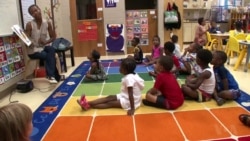Income inequality in the United States is a major election campaign issue. It is an issue of interest to many people across the country.
Studies have shown that 49 million Americans -- including one in four children -- are living in poverty. The United States Census Bureau says there were 43.1 million people in poverty last year. That is 3.5 million fewer than in 2014.
A community development program in Georgia is working to improve neighborhoods and help lift families out of poverty. It also helps young people from poor families get a good education.
The East Lake Foundation directs the community redevelopment programs in the East Lake neighborhood of Atlanta, Georgia. Daniel Shoy heads the foundation.
“So by having a high-quality education pipeline we are able to provide first class opportunities for our children, and really for their families, to help them move beyond the intergenerational cycle of poverty, to expose them to what I consider a world of possibilities.”
The program provides education to children from the age of three all the way to college. The three-year-olds attend classes where they focus mainly on reading. The program works to ensure the children can read well by the time they enter the third grade.
As they grow up, their progress is followed and they are urged to work hard. They attend the same public high school which has an educational curriculum that requires mathematics, science and technology.
“I’d say the most staggering result that we’ve seen is for our young people go from having only about five percent of its 5th graders be able to meet or exceed the state standard in math to now 95 percent of our young people across all core academic subjects meet and exceed that standard.”
Shoy notes that the children “are performing well compared to their peers across the country.”
The education program is just one of the activities offered to young people who live in the community.
Jalil Spearman grew up in the program and is now in the 11th grade. He hopes to become an engineer.
“Having all these different extra-curricular activities like engineering, dance, band, like, really helps you to, like, decide on what you like to do right now in high school, so when you go off to college you already know something that you want to do.”
Many of the students from poor families are performing as well as middle-class students.
Terez Chapman and her family moved to East Lake 15 years ago. She now attends college and works part-time.
“Knowing that someone else other than your family has taken a(n) interest in you, it really encourages you -- and makes you want to do better and set the bar high for yourself to make your own accomplishments.”
Terez Chapman says that support from teachers helps the students get the preparation they need to be successful in school and in life.
I’m Caty Weaver.
VOA’s Chris Simkins reported this story from Atlanta, Georgia. Christopher Jones-Cruise adapted his report for Learning English. George Grow was the editor.
We want to hear from you. Write to us in the Comments Section, or visit our Facebook page.
________________________________________________________________
Words in This Story
pipeline – n. the system for developing and producing something
intergenerational – adj. passing from one generation to the next
cycle – n. a set of events or actions that happen again and again in the same order; a repeating series of events or actions
expose – v. to cause (someone) to experience something or to be influenced or affected by something (often + to)
focus – v. to direct your attention or effort at something specific
curriculum – n. the courses that are taught by a school, college, etc.
staggering – adj. very large, shocking or surprising
core – adj. the most important or basic part of something
peer – n. a person who belongs to the same age group or social group as someone else
extra-curricular – adj. activities that happen at a school but not necessarily in a classroom, such as sports
set the bar – expression to change the standard that is used to judge whether someone or something is good, successful, etc.
accomplishment – n. something done, achieved or accomplished successfully





